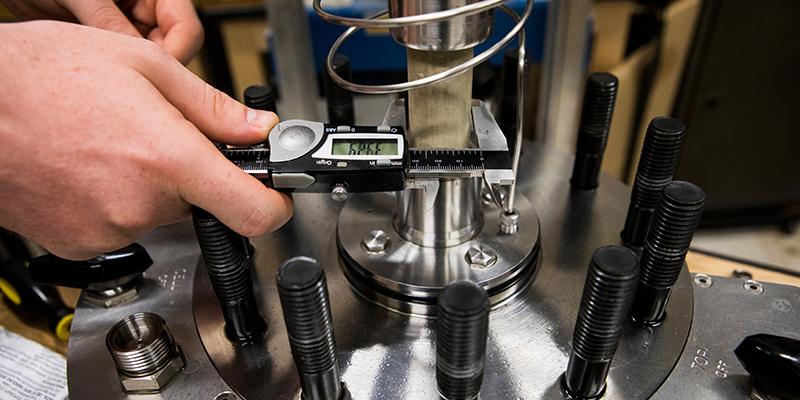Field of Study: Geosystems Engineering

The Geosystems field of study in the Civil and Environmental Engineering MS degree program offers two specialty concentrations: Geotechnical Engineering and Geohazards Engineering. Geotechnical engineering builds expertise in the design, analysis, and construction with earthen materials. The program provides an excellent foundation in soil behavior including training in the Tufts Advanced Geomaterials Laboratory. Geohazards engineering expands into the analysis and mitigation of natural hazards. The program prepares students to work in Catastrophe Modeling. MS students in the program have excellent networking opportunities and can participate in the Graduate Co-op. Companies and state authorities such as GEI, GZA, Langan, MBTA, and Tighe&Bonde have advertised 6-month Co-ops with Tufts.
Both programs are offered as full-time or part-time and most courses can be taken in-person or virtually. Part-time MS (non-thesis) students are expected to take one or two courses per semester. Part-time students can also select the thesis option and conduct independent in parallel with classwork.
Expectations for non-thesis option: A full-time student can complete this option (MS-non-thesis, minimum of 10 courses/30 credits) in two to three semesters.
Expectations for thesis option: A full-time student is expected to complete this option (MS-thesis) in two years. Requirements are the same as the non-thesis option with the provision that Thesis Research (6 course credits) may replace 3 credits of elective courses and 3 credits of professional practice.
Students will select the majority of courses from the following lists with the help of their advisor.
Geotechnical engineering
- CEE-113 Groundwater (3 credits; Fall)
- CEE-143 Site Remediation (3 credits; Fall)
- CEE-146 Foundation Engineering (3 credits; Fall)
- CEE-149 Earth Support Systems (3 credits; Spring)
- CEE-242 Advanced Soil Mechanics (3 credits; Fall)
- CEE-244 Laboratory and In-Situ Measurement of Soil Properties (4 credits; Fall)
- CEE-247 Geotechnical Earthquake Engineering (3 credits, Spring)
- CEE-293 Forensic Geotechnical Engineering (3 credits; Spring)
- CEE-293 Slopes and Embankments (3 credits, Fall)
- CEE-293 Numerical Methods in Geotechnical Engineering (3 credits, Spring)
- CEE-293 Unsaturated Soil Mechanics (3 credits, Fall)
Geohazards engineering
- CEE-111 Hydrology of the Built Environment (3 credits; Fall)
- CEE-132 Data Science for Sustainability (3 credits; Fall and Spring)
- CEE-187 Geographic Information Systems (3 credits; Fall)
- CEE-189 Introduction to Remote Sensing (3 credits; Fall)
- CEE-193 Resilient and Equitable Infrastructure (3 credits; Spring)
- CEE-201 Applied Probability Theory (2 credits; Fall)
- CEE-202 Data Analysis and Statistical Methods (2 credits; Fall)
- CEE-203 Statistical Inferences and Prediction (2 credits; Spring)
- CEE-214 Water Resource Systems (3 credits; Spring)
- CEE-242 Advanced Soil Mechanics (3 credits; Fall)
- CEE-247 Geotechnical Earthquake Engineering (3 credits, Spring)
- CEE-293 Slopes and Embankments (3 credits, Fall)
- CEE-293 Numerical Methods in Geotechnical Engineering (3 credits, Spring)
The MS program includes a professional practice requirement of one course that can be taken from the Department of Urban and Environmental Planning and Policy or Gordon Institute at Tufts.
Course details including course description, instructor, lecture time, and classroom assignment are available at Tufts SIS.
Faculty
Laurie Gaskins Baise: Geotechnical earthquake engineering, seismic hazard mapping, natural hazards, remote sensing
Luis Dorfmann: Mathematical models of material behavior, nonlinear magneto- and electromechanical interactions, biomechanics of soft materials, rubber elasticity and inelasticity, materials science
John (Jack) Germaine: Geotechnical, laboratory testing, automation, soil behavior, physical properties, mechanical properties, material science
Lucy Jen: Geotechnical engineering, foundation design, computational geotechnics
Magaly Koch: Remote sensing, groundwater resources and land change
Chris Swan: engineering education, geoenvironmental and geotechnical engineering
Farshid Vahedifard: Resilient and equitable infrastructure, impacts of extreme events in a changing climate on infrastructure and communities, climate adaptation of infrastructure
Robert Viesca: Applied mathematics and mechanics for geophysical and engineering problems